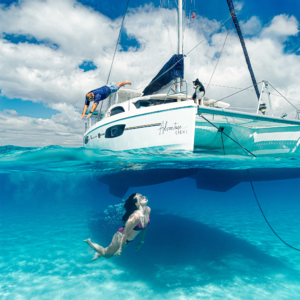You’ve probably heard the phrase “ignorance is bliss.” But is it really bliss if you’re causing unintentional harm? Read on to see why you have to stop using chemical sunscreens.
I grew up landlocked in Tennessee. Until moving to Florida, I had spent very little time on the open water.
I have to admit, I didn’t realize the dire issues our waterways are facing. Plastic, dying coral, off and on issues with red tide locally. I didn’t know what I didn’t know.
I became increasingly curious after seeing “Chasing Coral” pop up on my Netflix feed. I watched the trailer and I was fascinated by what I was learning. You can watch it here too.
The movie follows a team of photographers, divers, and scientists as they document the process of coral bleaching and what’s killing coral reefs throughout the world at an unprecedented rate. Coral bleaching happens when corals become stressed by changes in light, water temperature, or nutrients.
“When corals are stressed by changes in conditions such as temperature, light, or nutrients, they expel the symbiotic algae living in their tissues, causing them to turn completely white”
Stop using chemical sunscreens
Coral reefs are very important ecosystems throughout the world. They support other species, create barriers for shorelines, and provide support for commercial fisheries, just to name a few. Without coral reefs, life on planet earth wouldn’t be the same.
Now I know what you’re thinking.
What do chemical sunscreens have to do with coral reefs?
Many sunscreens contain harmful chemicals. The most notable bad guys are oxybenzone and octinoxate. When you wear them into the water they wash off and are toxic to marine life and the corals. This is a HUGE problem.
A 2015 study estimates 14,000 tons of sunscreen get into the world’s coral reefs EACH YEAR.
It has become so much of a problem Hawaii extended a ban in 2021 to include sunscreens containing two harmful petrochemicals (avobenzone and octocrylene). This is a follow-up to the initial ban in 2018 that banned the sale of sunscreens containing oxybenzone and octinoxate.
Key West, Florida has tried to impose its own measures. The city voted for sunscreen restrictions back in 2019 but was blocked by the governor to prohibit any chemical sunscreens.
These chemicals are dangerous for our largest organ, our skin!
The Center for Biological Diversity says, “research shows that octocrylene can disrupt human hormones and have toxic impacts on a variety of aquatic organisms, including corals, fish, and marine mammals.”
I don’t know about you but I don’t want that on my skin or in my body!
What kind of sunscreen should I wear?
The good news is there are a lot of great reef-safe sunscreens on the market that will still protect your skin from the sun and not cause more problems for our oceans.

Go for Zinc sunscreen
I have been using zinc sunscreen for years and I love it. Zinc oxide as an active ingredient in sunscreen blocks both UVA and UVB rays. That’s super important for protecting against burns, aging, and skin cancer. Something to know about zinc sunscreens is that they take a little extra elbow grease to rub them in and you should reapply every two hours.
My favorite daily face sunscreen is by Tizo. It’s light and goes on creamy and serves as a base for my makeup since it is tinted.
When I’m boating I like something that is more long-wear and water-resistant. I have to be careful because I get sun damage on my face very easily. So for boat days, I double up and wear the Baby Bare Mineral Sunscreen Stick and then I put my go-to sunscreen, Tizo on top of it.
My sunscreen recommendations
[show_shopthepost_widget id=”4573936″]No matter if you’re headed to the beach or doing daily activities, zinc sunscreen is best to use for both the safety of your skin and our planet. Have a favorite reef-friendly sunscreen? I’d love to hear about it in the comments!







One Response